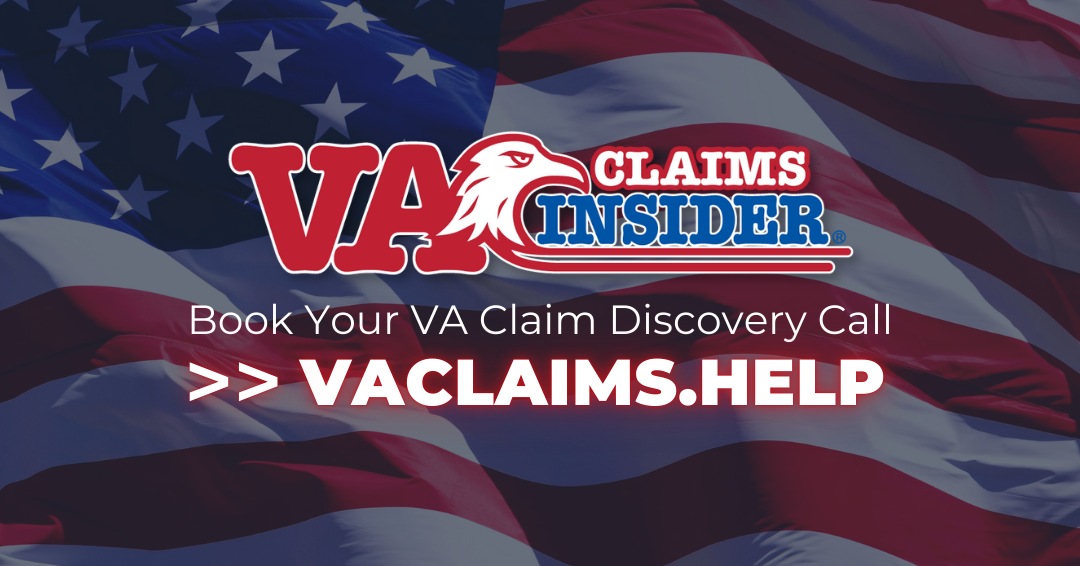Looking for Expert-Level VA Claim Answers?📱Call Us Now! 737-295-2226
Let me be very clear upfront: There is no such thing as a “guaranteed” VA disability claim.
The VA claim process is highly individualized and success depends upon a variety of factors including the veteran’s basic eligibility, military service history, availability of medical evidence, and the quality and credibility of the supporting documentation.
Even claims that appear to be strong on paper can face challenges due to factors like human error, insufficient evidence, or a bad Compensation & Pension (C&P) exam.
However, there are certain types of VA claims with higher rates of approval due to specific laws and regulations, such as presumptive conditions under the PACT Act or conditions that were diagnosed during military service with clear service connection.
We’ll dive deeper into those in this high-value blog post from VA disability expert Brian Reese.
Table of Contents
4-Minute Video: Are There GUARANTEED VA Disability Claims? Here’s 5 EASY to WIN VA Claims!
Summary of Key Points
- No VA Disability Claim is Guaranteed: Success in the VA disability claims process depends on individualized factors such as service history, medical evidence, and the quality of supporting documentation. Even strong claims can face challenges from insufficient evidence, human error, or a bad C&P exam.
- Certain Claims Have Higher Approval Rates: Claims like tinnitus, mental health conditions, presumptive conditions, musculoskeletal disorders, and secondary conditions often succeed due to specific laws, regulations, or strong medical connections to service.
- Medical Evidence Wins VA Claims: Period. At the very least, you need to provide medical records that document your condition with a formal diagnosis. Without medical evidence, the VA will struggle to understand whether you have the condition, how it’s related to your military service, and your current symptoms, making it harder to prove your VA disability claim.
- Understanding VA Ratings and Pro Tips is Essential: VA rates conditions under CFR Title 38, Part 4 using diagnostic codes with ratings from 0% to 100%, depending on severity of symptoms. Pro tips, like leveraging presumptive conditions or the VA Painful Motion Rule, can help veterans maximize their ratings.
Fellow Veterans: Do You Want to WIN Your VA Disability Claim FASTER?
Are you in need of expert-level VA claim help? Call us right now: (281) 533–6777.
Hi veterans, I’m Brian Reese, the VA Claims Insider, and I’m here to help you INCREASE your VA rating FASTER — even if you’ve already filed, been denied, gave up, or don’t know where to start…
If you’re frustrated, underrated, or simply sick and tired of fighting the VA alone, WE’VE GOT YOUR SIX!
Know this: There’s always another path available to you, regardless of past VA claim denials, and we’re committed to helping you achieve VA claim victory.
Our process starts with a one-on-one phone call so we can get to know your unique military service history and VA claim situation.
We’ll identify where you stand now, where you want to go, and how we can make it happen with the right medical evidence.
If we nail your VA claim strategy, the tactics become simple and easy!
Through this gap analysis process, we’ll build a personalized VA claim strategy tailored to your needs — designed to give you the best possible chance of securing the VA rating and compensation you’ve earned for serving our country.
>> Click HERE to book a date/time for your no-obligation consultation with a VA claim expert or call us right now at (281) 533–6777.
VA Claims That Are Easier to Win
While no VA claim is “guaranteed,” some types of claims have a higher likelihood of success and are easier to win than others:
#1. Tinnitus
Tinnitus is the perception of sound, such as ringing, buzzing, or clicking, without an external auditory source.
It’s the #1 easiest VA claim to win right now.
It often results from damage to the hair cells in the inner ear, which send false signals to the brain. Common causes include exposure to loud noise, aging, and certain medications.
- Common Symptoms: Ringing, buzzing, or humming in the ears; difficulty concentrating; sensitivity to sound; trouble sleeping.
- VA Ratings: The VA rates Tinnitus under CFR Title 38, Part 4, the Schedule for Rating Disabilities, Diagnostic Code (DC) 6260, Tinnitus, Recurrent at 10%. There is no higher, lower, or bilateral rating for Tinnitus.
- Pro Tip: Big changes are coming to VA ratings for tinnitus in 2025. Tinnitus will no longer be rated as a standalone condition under Diagnostic Code 6260; instead, it will be considered a symptom of an underlying condition, such as hearing loss, Meniere’s disease, or TBI. This change means veterans won’t be eligible for a separate 10% rating for tinnitus alone. However, veterans can still service-connect secondary conditions related to tinnitus for VA disability benefits.
#2. Mental Health Conditions
Mental health conditions in veterans, such as PTSD, depression, and anxiety, are often linked to the psychological impact of trauma during military service.
PTSD results from exposure to life-threatening events, while depression and anxiety can stem from prolonged stress from the job or loss.
- Common Symptoms: Flashbacks, nightmares, intrusive thoughts, emotional numbness, hypervigilance, mood swings, and social withdrawal.
- VA Ratings: The VA rates mental health conditions under CFR Title 38, Part 4, the Schedule for Rating Disabilities, using the General Rating Formula for Mental Disorders from 0% to 100% with breaks at 10%, 30%, 50%, and 70%. The average VA rating for mental health is 50% while the most common VA rating for mental health is 70%.
- Pro Tip: Huge changes are coming to VA mental health ratings in 2025. The VA is revising its criteria to better reflect how mental health disabilities impact veterans’ ability to work, aiming for fairer compensation. These updates should make it easier for veterans to secure higher ratings, with less strict requirements for 70% and 100% levels, a guaranteed minimum 10% rating for any diagnosed condition, and the removal of the 0% rating—a major win for veterans.
#3. Presumptive Conditions
Presumptive conditions are illnesses the VA assumes are service-connected due to specific exposures, such as Agent Orange or burn pits, or specific locations and times of military service.
Examples include Parkinson’s disease, ischemic heart disease, and some cancers.
There are over 300 presumptive conditions eligible for VA disability benefits.
- Common Symptoms: Vary depending on the condition but may include fatigue, respiratory distress, neurological issues, or cardiovascular symptoms.
- VA Ratings: The VA rates presumptive conditions under CFR Title 38, Part 4, the Schedule for Rating Disabilities using numerous Diagnostic Codes (DCs) with ratings from 0% to 100%, depending on the condition name and its severity of symptoms.
- Pro Tip: Presumptive VA claims are easier to win because they don’t require proving a “nexus” (link) to your military service. A presumptive disability is automatically considered service-connected by the VA if you served in a qualifying location during a specific time period and later developed a related condition. Simply provide your DD 214 showing service in the eligible location during the required timeframe and evidence of your qualifying condition, and the VA will grant automatic service connection.
#4. Musculoskeletal Conditions
Musculoskeletal conditions affect bones, joints, muscles, tendons, or ligaments and are very common in military veterans.
Examples include joint disorders, fractures, and chronic pain due to physical wear and tear or injuries during service.
- Common Symptoms: Pain, swelling, stiffness, weakness, reduced mobility, and joint instability.
- VA Ratings: The VA rates musculoskeletal conditions under CFR Title 38, Part 4, the Schedule for Rating Disabilities, using numerous Diagnostic Codes (DCs), with ratings from 0% to 100%, depending on the condition name and its severity of symptoms.
- Pro Tip: The VA Painful Motion Rule ensures veterans receive proper compensation for pain experienced during movement of musculoskeletal conditions, even without measurable range of motion (ROM) limitations. If you have any pain during motion, the VA must: (#1) consider it when determining your disability rating and (#2) award at least the minimum compensable rating for the affected joint or condition, regardless of the extent of motion limitation.
#5. Secondary Conditions
Secondary service connection occurs when a current service-connected condition causes or aggravates a new condition that isn’t already service-connected.
There are over 100 common secondary VA claims eligible for VA disability benefits.
- Examples Include:
- Sleep Apnea Secondary to PTSD: PTSD often causes chronic anxiety, stress, and poor sleep patterns, which can lead to sleep apnea. Medications prescribed for PTSD may also cause weight gain, a significant risk factor for obstructive sleep apnea.
- Radiculopathy Secondary to Back Pain: Chronic back pain can compress or irritate spinal nerves, leading to radiculopathy, which causes pain, tingling, or weakness in the arms or legs. This condition, commonly called sciatica, is often a direct result of unresolved back issues.
- Anxiety and Depression Secondary to Tinnitus: The constant ringing or buzzing in the ears from tinnitus can lead to frustration, sleep disturbances, and social isolation, contributing to anxiety or depression. Over time, the emotional toll of managing tinnitus can worsen mental health challenges.
- Migraines Secondary to Tinnitus: The stress and sensory overload caused by chronic tinnitus can trigger or aggravate migraine headaches. This link is particularly common in veterans who experience tinnitus as a result of noise exposure during service.
- Common Symptoms: Secondary conditions vary based on the condition, but common symptoms include chronic pain, mobility issues, sleep disturbances, or mental health impairments. For instance, sleep apnea secondary to PTSD might present with excessive fatigue, snoring, or interrupted breathing during sleep.
- VA Ratings: The VA rates secondary conditions under CFR Title 38, Part 4, the Schedule for Rating Disabilities, using numerous Diagnostic Codes (DCs), with ratings from 0% to 100%, depending on the condition name and its severity of symptoms.
- Pro Tip: Building a strong case for your secondary VA claim often means getting a Nexus Letter for a secondary condition from a qualified private medical professional to link the two conditions clearly. A Nexus Letter with high probative value can literally be the difference between an approval and a denial!
Want Expert-Level Help with Your VA Disability Claim? WE GOT YOUR SIX!
How does VA Claims Insider help veterans?
We make the confusing and frustrating VA claim process EASY through our 8-step proprietary system and one-on-one coaching; we’re the VA Claim EXPERTS you can trust, and YOU are never alone in this fight against the VA!
You’ll also receive VA disability expert Brian Reese’s SEM Method Blueprint—a proven formula that has helped over 25,000 veterans win their VA disability claims faster:
Strategy + Education + Medical Evidence = VA Rating and Compensation You Deserve FASTER!
Start today and unlock an exceptional level of service you deserve for serving our country:
➡️ You’ll hear from a VA Claim Expert over email within 15 minutes of signing up today.
➡️ You’ll hear from your Veteran Coach team within 24 hours of all inquiries during normal business days/hours.
➡️ Our terms are clear and simple: If we don’t win, you don’t pay. You have nothing to lose and everything to gain.
Click the red button below to start the process of winning your VA claim right now!
Ready to WIN, SERVICE-CONNECT, and INCREASE Your VA Rating FASTER? We’ll Get Squared Away!

- VA Claims Insider is the #1 most trusted name in VA disability claims.
- Work directly with a VA claims coach who can help lead you to VA claim victory.
- 25,000+ disabled veterans served in our membership programs since 2016.
- 30% average rating increase for veterans who complete our #1 rated Elite program.
- 4.7/5.0 average rating out of 5,500+ total reviews; over 4,500 5-star reviews.
About the Author

Brian Reese
Brian Reese is a world-renowned VA disability benefits expert and the #1 bestselling author of VA Claim Secrets and You Deserve It. Motivated by his own frustration with the VA claim process, Brian founded VA Claims Insider to help disabled veterans secure their VA disability compensation faster, regardless of their past struggles with the VA. Since 2013, he has positively impacted the lives of over 10 million military, veterans, and their families.
A former active-duty Air Force officer, Brian has extensive experience leading diverse teams in challenging international environments, including a combat tour in Afghanistan in 2011 supporting Operation ENDURING FREEDOM.
Brian is a Distinguished Graduate of Management from the United States Air Force Academy and earned his MBA from Oklahoma State University’s Spears School of Business, where he was a National Honor Scholar, ranking in the top 1% of his class.




